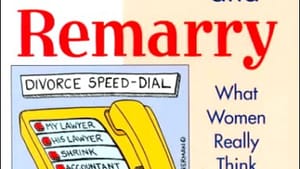Stay in the Loop
BSR publishes on a weekly schedule, with an email newsletter every Wednesday and Thursday morning. There’s no paywall, and subscribing is always free.
Trashed on Twitter for something I didn’t do
What happens when bringing up the truth just gets you blocked?

A writer I’d never heard of sent me a snarky tweet recently, with an image of the cover of one of my books and the question, “Did you come up with this title yourself?”
The charge
At first, I was confused. Why was she asking me this question? Then I checked her Twitter feed and realized that she thought that I’d stolen her book title, Eat, Drink and Remarry, and was calling me out about it.
The book by that title, which I had edited, is a collection of women’s cartoons that was published in 2000. My fellow writer’s book came out in 2014. Which means that her Eat, Drink and Remarry was published 14 years after mine. And yet she was accusing me of ripping her off?
Two of her followers quickly joined the fray.
“How completely tacky of her,” one tweeted about me.
“Wow, that’s chutzpa!” said another.
I’m guessing that instead of checking the publication date of our respective books, the other writer just assumed that hers had come out first. Or maybe she thought I was a time traveler who had visited the future just to seek out a fabulous book title and had stolen hers.
Either way, everyone knows that you can’t copyright a book title.
The correction
Still, I tried to set her straight. “My book came out 14 years before yours did,” I tweeted back. “What are you complaining about?”
She responded with a gracious apology.
Ha ha. Just kidding. This was Twitter.
She responded by asking me, “Did your book get great reviews, sell thousands of copies, get quoted on countless talk shows and make a big media splash?”
“Nope,” I tweeted back. “My book was published by a small press, sold modestly and then went out of print. I still don’t understand what you’re accusing me of.”
At which point the person who had tweeted about my “chutzpah” apologized. “I assumed that your book was published after hers,” she explained.
“No problem,” I told her. “I’m guessing that she did, too.”
Still no apology from my original accuser.
The aftermath
Meanwhile, friends I told about this brouhaha, many of whom are writers or other creators themselves, weighed in.
“It’s easy enough to do a search on a book title, which is something I usually do. Lots of duplicate titles out there. She needs to get over herself,” one told me.
“I’m going to name my next book ‘Absalom, Absalom!’ And then get really pissed at Faulkner,” another friend announced.
A week later, I had yet to receive an apology. So I decided to check the accuser’s Twitter feed. Maybe I’d missed a tweet saying she was sorry about wrongly accusing me of title theft.
She’d blocked me. I guess that was easier than saying she was sorry. At least that’s one less toxic tweeter I’ll have to deal with.
The trouble
I wouldn’t give this little flap another thought, except that it’s far too typical of how so many people behave these days, especially on social media, where the truth doesn’t seem to matter.
People don’t bother to gather the facts. They just assume their opinions are true and act on that assumption. So what if the reality they perceive is actually "fake news"? They believe it’s true — that’s all that matters.
And if you prove them wrong? They don’t change their mind. They just tune you out. If they’re wrong, they don’t want to hear about it.
Fortunately, not everyone has succumbed to a fact-free world. The woman who’d jumped in to accuse me of chuptzah demonstrated the correct way to respond when you find out you’re wrong. She faced the facts, recognized the truth, and changed her mind. Not only that, but she apologized.
I was happy to accept her apology. Everyone gets things wrong at times. What’s important, what keeps civilization going and the social fabric strong, is how we respond when we realize the facts don’t support our perspective. This Twitter denizen gives me hope. But I’m afraid that my original accuser’s attitude is all too prevalent right now.
If people continue to refuse to face facts and instead tune out or block anyone who demonstrates the truth, we’re all in big trouble.
Image description: The cover of the book Eat, Drink and Remarry: What Women Really Think About Divorce, edited by Roz Warren. It has an illustration of a yellow corded phone with speed-dials labeled “My lawyer,” “His lawyer,” “Shrink,” “Accountant,” and “Masseusse.”
Sign up for our newsletter
All of the week's new articles, all in one place. Sign up for the free weekly BSR newsletters, and don't miss a conversation.
 Roz Warren
Roz Warren